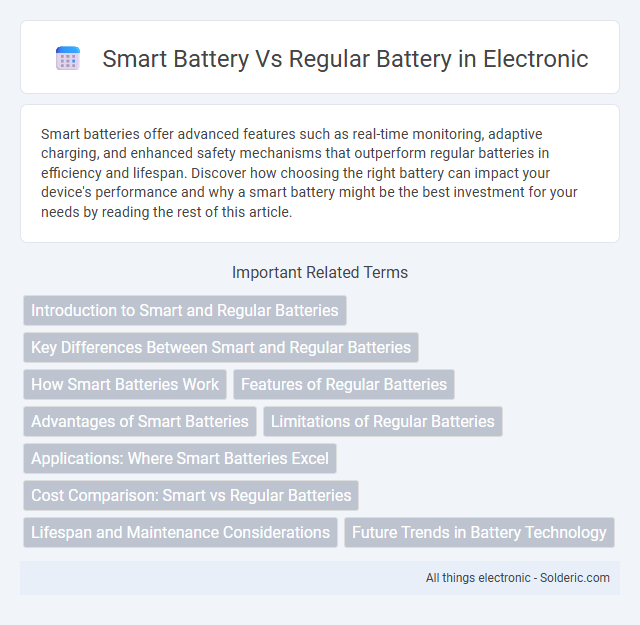Smart batteries offer advanced features such as real-time monitoring, adaptive charging, and enhanced safety mechanisms that outperform regular batteries in efficiency and lifespan. Discover how choosing the right battery can impact your device's performance and why a smart battery might be the best investment for your needs by reading the rest of this article.
Comparison Table
| Feature | Smart Battery | Regular Battery |
|---|---|---|
| Battery Management | Integrated circuits for monitoring charge, health, and temperature | No built-in management; relies on external devices |
| Communication | Supports data communication via SMBus or I2C protocols | No communication capabilities |
| Performance | Optimized charging and discharging for longer lifespan | Standard charging, may degrade faster |
| Safety Features | Built-in protection against overcharge, over-discharge, and overheating | Limited safety features |
| Cost | Higher initial price due to advanced technology | Lower cost, basic technology |
| Application | Used in laptops, smartphones, electric vehicles | Used in flashlights, toys, remote controls |
Introduction to Smart and Regular Batteries
Smart batteries integrate advanced circuitry that monitors and optimizes power usage, enhancing device performance and battery lifespan, while regular batteries rely solely on chemical energy without dynamic management systems. Your devices benefit from smart batteries' ability to communicate charge status, prevent overcharging, and provide precise battery health data, which regular batteries lack. Choosing smart batteries ensures improved safety, efficiency, and reliability compared to traditional regular batteries.
Key Differences Between Smart and Regular Batteries
Smart batteries feature integrated microprocessors that enable real-time monitoring of voltage, temperature, and charge levels, enhancing safety and efficiency compared to regular batteries. Your device benefits from extended lifespan and accurate power management through these intelligent features, while regular batteries rely on basic chemical reactions without advanced controls. The key difference lies in smart batteries' ability to communicate with devices for optimized performance versus the fixed capacity and limited feedback of regular batteries.
How Smart Batteries Work
Smart batteries incorporate integrated circuits that monitor voltage, current, temperature, and state of charge to optimize performance and extend battery lifespan. These batteries communicate with devices through a battery management system (BMS) to provide real-time data and prevent overcharging or deep discharging. Unlike regular batteries, smart batteries enable precise energy management, enhancing safety and efficiency in electronic devices.
Features of Regular Batteries
Regular batteries typically consist of primary cells such as alkaline or zinc-carbon, which provide a fixed voltage output without integrated monitoring capabilities. These batteries lack built-in sensors or communication systems to report charge status, relying solely on external devices to measure remaining capacity. Their simple design results in lower cost but offers limited safety features and less efficient energy management compared to smart batteries.
Advantages of Smart Batteries
Smart batteries offer enhanced energy management through integrated sensors and microprocessors that monitor temperature, charge levels, and battery health, ensuring optimal performance and safety. They provide longer lifespan and improved reliability by preventing overcharging and overheating, which reduces maintenance costs and downtime. Your devices benefit from faster charging and accurate runtime predictions, maximizing efficiency and user convenience.
Limitations of Regular Batteries
Regular batteries often suffer from limited lifespan, reduced capacity with repeated charging cycles, and lack of real-time monitoring for charge levels and health status. These limitations can lead to unexpected downtime and inefficient energy use, impacting the overall performance of your devices. In contrast, smart batteries provide advanced management systems that enhance usage efficiency and prolong battery life.
Applications: Where Smart Batteries Excel
Smart batteries excel in applications requiring advanced monitoring and communication capabilities, such as laptops, smartphones, and electric vehicles where precise battery management enhances performance and longevity. These batteries provide real-time data on charge levels, temperature, and health status, enabling optimized power usage and safety features that regular batteries lack. Your devices benefit from smarter energy management, reducing risks of overcharging and extending overall battery life in critical applications.
Cost Comparison: Smart vs Regular Batteries
Smart batteries typically cost 30-50% more than regular batteries due to integrated electronics that enhance performance and lifespan monitoring. While the upfront investment is higher, smart batteries offer longer service life and reduced maintenance costs, which can lower total ownership expenses over time. Evaluating Your specific needs and usage patterns helps determine if the premium cost of a smart battery provides sufficient value compared to a standard battery.
Lifespan and Maintenance Considerations
Smart batteries offer a longer lifespan compared to regular batteries due to their built-in monitoring systems that prevent overcharging and deep discharging, which are primary causes of battery degradation. Regular batteries require frequent manual checks and maintenance to avoid damage, while smart batteries optimize charge cycles automatically, reducing wear and tear. Your device's overall performance and battery health improve significantly when using a smart battery designed to manage power usage efficiently.
Future Trends in Battery Technology
Smart batteries integrate advanced sensors and communication capabilities, enabling real-time monitoring of charge, health, and temperature, which enhances safety and efficiency compared to regular batteries. Future trends in battery technology emphasize solid-state designs, longer lifespan, faster charging, and improved energy density, driving innovation in electric vehicles and portable electronics. You can expect smarter, more adaptive energy storage solutions that optimize performance while reducing environmental impact.
Smart battery vs regular battery Infographic

 solderic.com
solderic.com